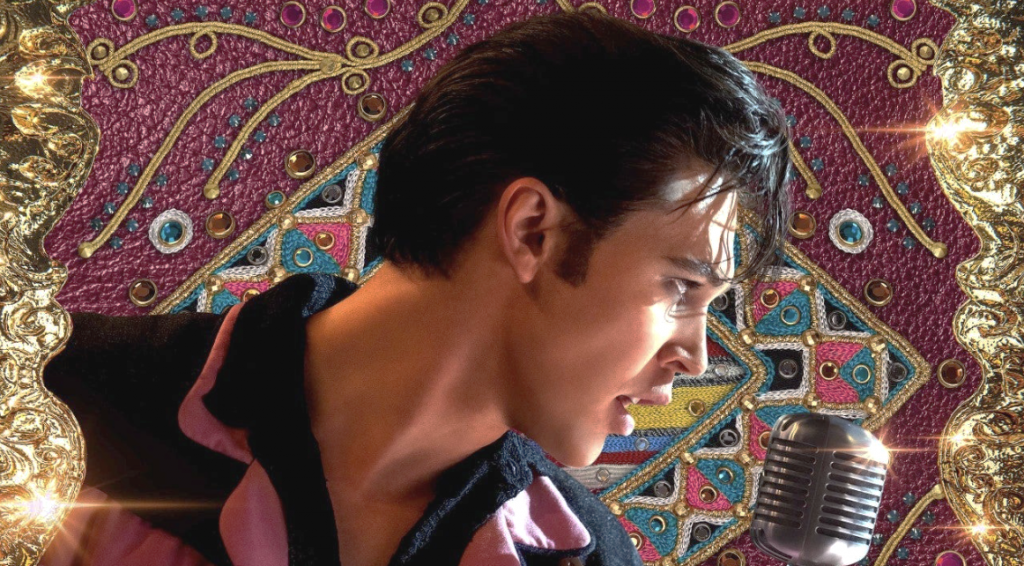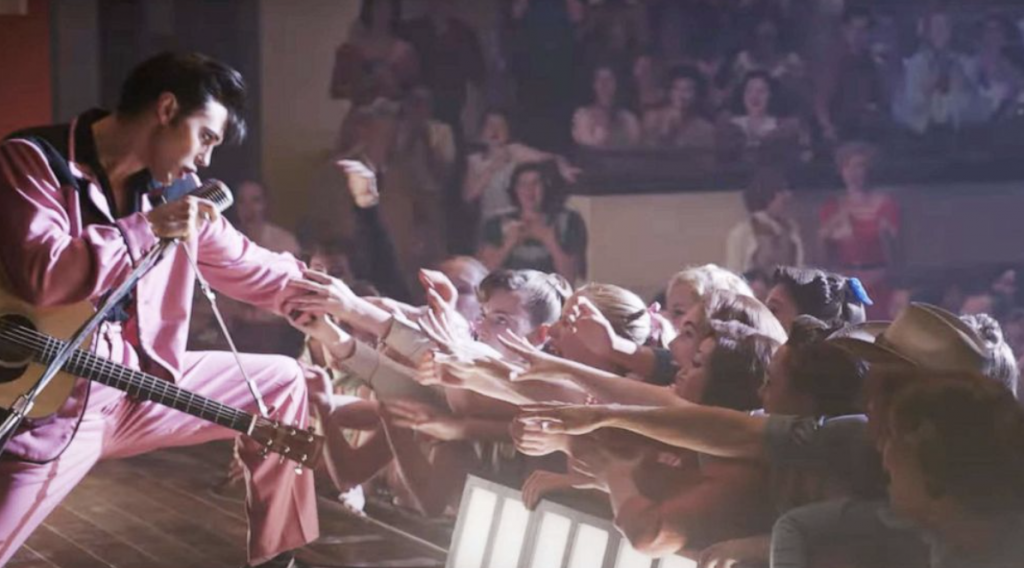
It couldn’t have come at a worse time. Director Baz Luhrmann, known for his extravagant displays and emphasis on luxury, seemed to be the most suitable fit to direct, produce and write the story of the one of the greatest star of the 20th century, Elvis Presley.
Presley is played by Austin Butler. He is portrayed to us as a charming, poor kid living in the whites-only subsidized housing in 1935 Tupelo, Mississippi. Presley is seemingly just an all-American boy with big dreams and a resonant voice that could impress any southern gospel singer. Butler plays a character who wishes to do right in the world with his talent and provide for his family.
Elvis Presley is the best-selling individual artist of all time. With hits ranging from “Jailhouse Rock”, “Hound Dog”, “Suspicious Minds”, “Can’t Help but Falling in Love,” and many more chart-topping hits. There is no questioning around the legacy of “the King of Rock n’ Roll.” Yet, in a political climate where it’s not only just but overdue to reveal the full truths of our beloved icons, “The King” has fallen short in the eyes of a generation that can access music history within a blink of an eye. Although his hit song “Hound Dog” swooned the post-war and Baby Boomer generation, Millennials and Gen Z have removed the rose-tinted glasses to see Elvis Presley as a culture vulture of trailblazing Black rock artists such as the creator of Rock n’ Roll, Big Mama Thornton, alongside B.B. King, Ike Turner, Ray Charles and more.
Elvis was innovative, popular, influential, and an entertaining performer–but he didn’t invent anything. Elvis’ first hit in 1954, “That’s All Right,” came when rock was an established genre of music with its own household names in the works and on tour. Luhrmann attempts to make “The King” into a relatable character that simply tried his best–despite owning a golden toothbrush.
However, the movie attempts to reconcile with all the controversies by having Big Mama Thornton sing her version of ”Hound Dog”, which was released four years before the more famous cover by Presley. Alongside the overdue accreditation for “Hound Dog,” he makes a casual appearance or two at the historically Black Beale Street in Memphis, Tennessee, the home of Rock music. Luhrmann directs these scenes to imply Presley is not merely the culture vulture made out to be in mass media but a member of the predominantly Black Rock n’ Roll community. Butler portrays Elvis as an aficionado and appreciator of the genre. Additionally, there is a short scene where he corrects who the real King of Rock n’ Roll is (hint: It’s Chuck Berry.)
The directing, while bright, bold and a bit disorienting, still manages to immerse you into the life of a true rock star decorated by pink Cadillacs and the finest clothes money can buy. We are introduced to Elvis when he performs presumably at his first show– the beginning of the hollering-craze for a man that moves in ways that are viewed as scandalous yet desirable and salacious. Thus, earning the nickname “Elvis the Pelvis.” This leads to larger issues with the national government because he is a White man singing Black music, dancing vulgarly and “corrupting” young American girls across the country.

However, this proves to be a profitable opportunity for the slick and dirty manager of Elvis’ life Colonel Tom Parker. Elvis performs at a caliber no other artist can do. Played by award-winning actor Tom Hanks, Colonel Tom Parker narrates the film through his point of view. We see the beginning of Elvis and most importantly his talent. Parker states at his first show “In that moment, Elvis the man was sacrificed and Elvis the God was born.” A kid with that voice and showmanship is what Parker believes is “the greatest show on earth” and the Colonel immediately acts on the potential of Presley. The plot thickens when just one scene later, the government unveils his illegal status as an illegal alien hiding in America. Parker’s ulterior motives are revealed as a man with an insatiable appetite for the money gained in the Presley name.
The movie plays out to show the slow-brewing feud between Colonel Tom Parker and Elvis. The colonel sees the first performance of Elvis and immediately takes him under his management so that he can “fly.” This makes the then young Elvis over-eager and gullible to Parker’s puppeteering of the musician’s life, health, finances, sponsorships and much more.
This leads to back-to-back touring, merchandise, the beginning of a drug addiction, women, fame and fortune for the protagonist and the stress of fame becomes too much to bear for Elvis. Yet money starts pouring in for Elvis and allows him to buy, amongst many things, the iconic Presley Graceland estate under the newly-formed and well-known Elvis Presley Enterprises. Elvis’ passive father, Vernon Presley (Richard Roxborough), spearheads the company but also falls under the control of the colonel.
The movie continues to make Elvis wiser than his reality–marrying Priscilla Presley, fathering one child, Lisa Marie Presley and following his ups and downs of popularity.
We are given what feels like a long montage rather than a storyline that follows Elvis’ six years of service overseas in Germany. He is mandated to serve in the army due to the scandalous dance moves we see earlier that were disapproved by the conservative-leaning government and population. He is told to either stop dancing (which prompts Butler’s character to dramatically say “If I can’t dance then I can’t sing!”) or serve in the military. Elvis agrees to become an American hero and serve his country, cut his slicked-back hair, and wipe off the funny eyeliner. It is when he is overseas in Germany that he meets Priscilla, a then 14 year-old teenage girl, whose father was an Air Force pilot. Presley returns home reformed from his “Elvis the Pelvis” scandal.
He began his dazzling acting career that spanned 11 years and over 31 feature films, the 1968 “comeback special” in front of his first live audience post 11-year hiatus featuring his political protest song, “If I Can Dream.” The song revitalizes and deepens the fame of Elvis and leads to critical acclaim. Elvis becomes cool again after the scrutinized tail-end of his acting career. Additionally, following the revival of his career, he is convinced to do a residency at the famous International Hotel in Las Vegas; the city most associated today with the name and elements of flashiness and flamboyance of Elvis. However, the money promised to Elvis and his manager from the residency deal alone pushes Colonel Tom Parker to force, delude and threaten Elvis there for five years, despite the musician’s pleas to tour overseas on his private jet. The colonel puts fear into the musician over security issues overseas.
The casual viewer is indulged in the well-known pop culture blips of the singer’s life. We see the extravagant costumes and cape attachment, usually seen with bedazzling and/or with a large tiger stitched into the chest, the famous “Elvis has left the building!” aphorism, the moves, the hair and the music giving the viewer the full scope of not just the man but surrounding fame of his career.
Marking the grim end of his life and subsequently darker filming, is the divorce from Priscilla. A consequence of deep drug addiction and exhaustion from performing that hospitalized Elvis in the midst of touring in his mid-to-late 30’s and early 40’s. Despite the worldwide fame, he never left the continent except when in service. However, his 1973 special, “Elvis – Aloha from Hawaii, via Satellite,” was seen in 40 countries by more than 1 billion people and made television history. It was seen on television in more American homes than man’s first walk on the moon. He performed to the fullest degree at each show. During his “concert years” from 1969 to 1977, Elvis gave nearly 1,100 concert performances despite a complete change in his appearance due to a worsening drug addiction and his status at the end of his career as a washed-out singer for an older audience.
The movie ends with the fading legacy of the king, and the grief felt over his death across the nation. The movie ends with Colonel Tom Parker telling his side of the story and his case that he was not at fault for the constant exploitation of his sole client. Yet the credits flash with summaries that state Parker lost a lawsuit in the years following Elvis’ death for exploitation. Elvis’ doctor is heavily fined for the overdose of drugs given to the late singer. (Spoiler alert: we don’t see Austin Butler dramatically die on the toilet.)
Overall, Austin Butler gives a truly Oscar-worthy performance, nearly replicating the deep voice of the late singer and personifying his moves, gimmicks and mannerisms to the fullest. Tom Hanks’ accent must be tuned out a bit in the mind to enjoy the narration throughout the movie. After watching you might find yourself humming a tune or two or revisiting a fact or pop culture event that slipped your mind and is presented back to you. The two-and-a-half hour long film doesn’t leave you bored or even angry. Luhrmann presents what feels like a prolonged montage of “the King” that never reaches a true end. Be sure to watch “Elvis” in theaters or stream it on HBO Max later this summer.

